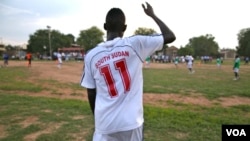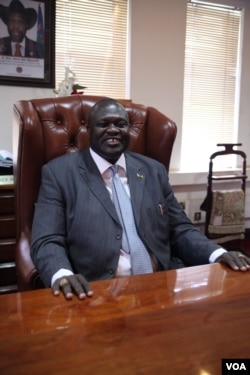JUBA — South Sudan celebrates its first birthday on July 9. The country's first year was a tumultuous one that saw renewed fighting with former civil war foe Sudan and the shutdown of oil production. The new nation has failed to live up to the hopes and dreams of a war-weary population which lives in widespread poverty.
Last year on July 9, the country was filled with euphoria when South Sudan split from the north after almost 50 years of war. The excitement was felt in every corner of the country. One year later, the government has failed to meet many expectations.
"The people have been expecting their lives to be changed for the better, and this was our goal. Unfortunately we have not delivered as expected, expectations are very high -some are realistic, some are exaggerated, but we admit that it's the right of people to expect that they should get services and development from their government, otherwise there was no point for people to take up arms to say 'let the underdog get their rights', we would be hypocrites if we forget about the people we went to war [with] to purportedly liberate," said deputy government spokesman Atem Yaak Atem.
Vice President Riek Machar agrees. But he claims the letdown is due to "unforeseen difficulties" in relations with former foe Sudan, who South Sudan said was "stealing" its oil during export to the north and led to the new nation shutting down oil production that makes up 98 percent of its revenue.
"The people expected a lot, and with such expectations it became challenging and also became difficult for our people, particularly economically, because of what has happened," said Machar. "We closed the flow of the oil, the flow of the pipeline, for good reasons."
But George Conway, head of the United Nations Development Program, said that after such sustained conflict that killed almost two million people and displaced many throughout the country and abroad, building a nation was never going to be easy.
"It is one year into what we know is going to be a long and hard process," said Conway. "State building is never easy, and particularly when you look at a situation like South Sudan, coming out of the longest-running civil war in Africa and with a capacity baseline unlike anywhere else in the continent. You've really got a situation where we have to keep things in perspective."
Leader of the Opposition SPLM-DC party, Onyoti Adigo Nyikwec, says that instead of progressing, the country has slid back to where it was in 2005, when a peace deal was signed to end 21 years of civil war.
"There are no schools, and even the few schools that we have, because of the influx of returnees, they are not able to accommodate most of them," said Onyoti. "Also, the medical places like hospitals primary health care and these areas, you find that it is difficult to get medicine, so you will find that there are no good doctors."
The opposition claim that the rebel army-turned-government is still acting like the military, making rash decisions about whether to head back to a brief war in April and shut down the oil without consulting other parties.
Government spokesman Atem says that huge efforts are being made to transform the institutions, but blames "provocation" from Khartoum, that he claims still wants to destabilize the south through bombing and funding militia groups.
"There's no denying that the war mentality and environment is visible and can be found, and there's nothing strange about that. Officially the war ended on [the] 9th [of] January 2005, but in reality, the war continued in different forms," Atem noted.
Ajang Ajang, head of the Student Union at Juba University, says that the lack of funding in basic services is paving the way towards generations of elitism. Ajang notes that education may be the most critical lacking service as the country looks toward the future.
"The few individuals who have their kids schooled abroad will hijack the power, the majority will continue to remain poor," said Ajang. "We are also seeing the majority, who are in dire need of these basic services like health, like education, will never be able to able to attain them as they will always be kept out of the circle of development, and so we are seeing that we are being marginalized."
Leaked memos from the World Bank revealed predictions that the economy could crumble between July and the end of the year, claims Vice President Machar has brushed off as "erroneous."
"We are talking with those who see our big potential to give us short-term loans, long-term loans, until we correct the situation of exporting the oil," said Machar. "So we have a plan. We discussed those before the shutdown. We will prove the prophets of doom wrong."
Machar also responded to corruption claims by President Salva Kiir, who accused 75 ministers of stealing $4 billion. Machar said the accusation of theft was incorrect on the basis that the figure was such a large sum of money.
Visiting South Sudan on Friday, Nobel peace prize winner Archbishop Desmond Tutu urged the government to wage peace with Sudan, and warned of the failures to deliver the "so-called peace dividends" to the people.
"It is absolutely crucial that peace and good neighborliness exist between the two because you are going to keep the people quiet for only so long," said Tutu.
Despite the many challenges facing South Sudan, the United Nations' George Conway believes that South Sudan will ultimately succeed.
"I've always been optimistic about South Sudan. Number one, the population has got to be one of the most resistant populations and has been through phenomenal hardship over the recent decades," noted Conway. "I'm confident that they're going to figure a way through this current period and come out on a trajectory that enables positive growth and development to happen. It's going to be tough, and austerity times are tough, but I'm confident that they are going to work through this."
Last year on July 9, the country was filled with euphoria when South Sudan split from the north after almost 50 years of war. The excitement was felt in every corner of the country. One year later, the government has failed to meet many expectations.
"The people have been expecting their lives to be changed for the better, and this was our goal. Unfortunately we have not delivered as expected, expectations are very high -some are realistic, some are exaggerated, but we admit that it's the right of people to expect that they should get services and development from their government, otherwise there was no point for people to take up arms to say 'let the underdog get their rights', we would be hypocrites if we forget about the people we went to war [with] to purportedly liberate," said deputy government spokesman Atem Yaak Atem.
Vice President Riek Machar agrees. But he claims the letdown is due to "unforeseen difficulties" in relations with former foe Sudan, who South Sudan said was "stealing" its oil during export to the north and led to the new nation shutting down oil production that makes up 98 percent of its revenue.
"The people expected a lot, and with such expectations it became challenging and also became difficult for our people, particularly economically, because of what has happened," said Machar. "We closed the flow of the oil, the flow of the pipeline, for good reasons."
But George Conway, head of the United Nations Development Program, said that after such sustained conflict that killed almost two million people and displaced many throughout the country and abroad, building a nation was never going to be easy.
"It is one year into what we know is going to be a long and hard process," said Conway. "State building is never easy, and particularly when you look at a situation like South Sudan, coming out of the longest-running civil war in Africa and with a capacity baseline unlike anywhere else in the continent. You've really got a situation where we have to keep things in perspective."
Leader of the Opposition SPLM-DC party, Onyoti Adigo Nyikwec, says that instead of progressing, the country has slid back to where it was in 2005, when a peace deal was signed to end 21 years of civil war.
"There are no schools, and even the few schools that we have, because of the influx of returnees, they are not able to accommodate most of them," said Onyoti. "Also, the medical places like hospitals primary health care and these areas, you find that it is difficult to get medicine, so you will find that there are no good doctors."
The opposition claim that the rebel army-turned-government is still acting like the military, making rash decisions about whether to head back to a brief war in April and shut down the oil without consulting other parties.
Government spokesman Atem says that huge efforts are being made to transform the institutions, but blames "provocation" from Khartoum, that he claims still wants to destabilize the south through bombing and funding militia groups.
"There's no denying that the war mentality and environment is visible and can be found, and there's nothing strange about that. Officially the war ended on [the] 9th [of] January 2005, but in reality, the war continued in different forms," Atem noted.
Ajang Ajang, head of the Student Union at Juba University, says that the lack of funding in basic services is paving the way towards generations of elitism. Ajang notes that education may be the most critical lacking service as the country looks toward the future.
"The few individuals who have their kids schooled abroad will hijack the power, the majority will continue to remain poor," said Ajang. "We are also seeing the majority, who are in dire need of these basic services like health, like education, will never be able to able to attain them as they will always be kept out of the circle of development, and so we are seeing that we are being marginalized."
Leaked memos from the World Bank revealed predictions that the economy could crumble between July and the end of the year, claims Vice President Machar has brushed off as "erroneous."
"We are talking with those who see our big potential to give us short-term loans, long-term loans, until we correct the situation of exporting the oil," said Machar. "So we have a plan. We discussed those before the shutdown. We will prove the prophets of doom wrong."
Machar also responded to corruption claims by President Salva Kiir, who accused 75 ministers of stealing $4 billion. Machar said the accusation of theft was incorrect on the basis that the figure was such a large sum of money.
Visiting South Sudan on Friday, Nobel peace prize winner Archbishop Desmond Tutu urged the government to wage peace with Sudan, and warned of the failures to deliver the "so-called peace dividends" to the people.
"It is absolutely crucial that peace and good neighborliness exist between the two because you are going to keep the people quiet for only so long," said Tutu.
Despite the many challenges facing South Sudan, the United Nations' George Conway believes that South Sudan will ultimately succeed.
"I've always been optimistic about South Sudan. Number one, the population has got to be one of the most resistant populations and has been through phenomenal hardship over the recent decades," noted Conway. "I'm confident that they're going to figure a way through this current period and come out on a trajectory that enables positive growth and development to happen. It's going to be tough, and austerity times are tough, but I'm confident that they are going to work through this."





